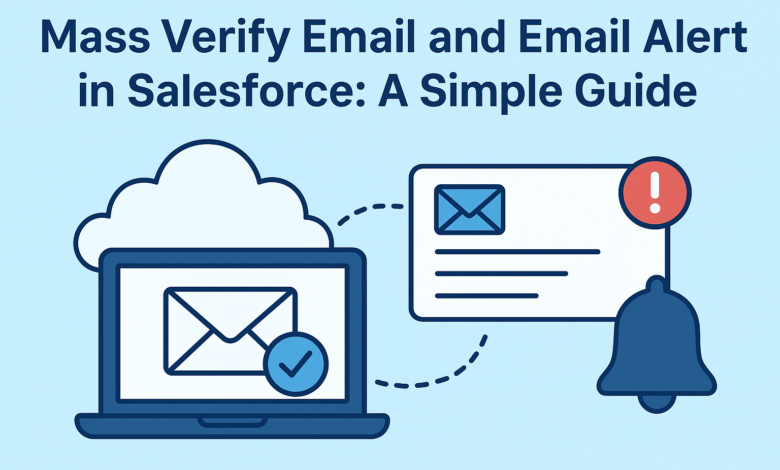Mass Verify Email and Email Alert in Salesforce: A Simple Guide

Salesforce is one of the most powerful customer relationship management (CRM) platforms used to manage data, automate tasks, and communicate effectively with clients. Among its many features, mass email verification and email alerts play an important role in improving communication accuracy and workflow efficiency. Understanding how these functions work can help businesses maintain clean data and deliver timely updates to customers or internal teams.
Understanding Email Verification in Salesforce
Email verification in Salesforce ensures that the email addresses stored in your database are valid and active. This step is crucial because sending messages to invalid or inactive addresses can harm your email deliverability, increase bounce rates, and affect campaign performance.
When you mass verify emails in Salesforce, you confirm the accuracy of multiple contacts or leads at once instead of checking each record manually. This process helps:
-
Maintain a clean and updated contact list.
-
Prevent wasted resources on invalid addresses.
-
Improve sender reputation and deliverability rates.
-
Enhance the overall success of email marketing campaigns.
Benefits of Mass Email Verification in Salesforce
-
Better Campaign Results: Verified email lists ensure your marketing emails reach real customers.
-
Reduced Bounce Rates: Invalid addresses are removed before campaigns are launched.
-
Improved CRM Data Quality: Keeps your Salesforce records accurate and reliable.
-
Time Efficiency: Automating verification saves hours of manual work.
Clean data is essential for every business using Salesforce, especially when handling large-scale marketing and customer communication activities.
What Are Email Alerts in Salesforce?
Email alerts in Salesforce are automated messages triggered by specific actions or conditions. For example, when a lead is assigned, an opportunity is closed, or a case is updated, Salesforce can automatically send an email to the right person or team.
These alerts are part of Salesforce’s Workflow Rules and Process Builder (or Flow in the newer versions). They help ensure that key updates or notifications are never missed.
Common Uses of Email Alerts
-
Lead Notifications: Send an email to a sales representative when a new lead is created.
-
Customer Updates: Notify customers when their case or order status changes.
-
Internal Reminders: Alert managers when a deal reaches a specific stage.
-
Approval Processes: Automatically inform users when an approval request is sent or completed.
How to Create an Email Alert in Salesforce
Here’s a simplified step-by-step process:
-
Go to Setup in your Salesforce dashboard.
-
Navigate to Workflow Rules, Process Builder, or Flow.
-
Select the object (like Lead, Case, or Opportunity).
-
Define the condition or criteria that will trigger the alert.
-
Create the email template for the alert.
-
Choose recipients and save the configuration.
Once active, the system automatically sends emails based on your defined triggers — ensuring smooth and timely communication.
Benefits of Email Alerts in Salesforce
-
Automation: Reduces manual follow-ups and improves productivity.
-
Consistency: Ensures uniform and timely messages.
-
Improved Response Time: Helps teams act quickly on important updates.
-
Better Customer Experience: Keeps clients informed and engaged.
Bringing It Together: Email Verification + Alerts
Using mass email verification alongside email alerts in Salesforce creates a powerful communication system. Verified email addresses guarantee message delivery, while automated alerts ensure important updates reach the right people instantly. Together, they enhance operational efficiency, maintain data accuracy, and strengthen customer relationships.
Final Thoughts
Both mass email verification and email alerts in Salesforce are essential tools for maintaining communication reliability and data quality. By verifying email lists regularly and automating alerts for key actions, businesses can streamline their operations, improve engagement, and build trust with customers.
Whether managing large campaigns or internal notifications, these features make Salesforce a more intelligent and efficient CRM platform for every organization.



